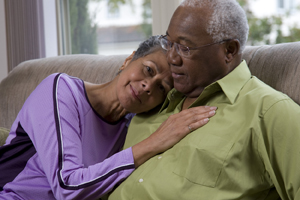Intimacy After Stroke
Sex is a normal part of any intimate relationship. A stroke can cause changes that can affect your ability or desire to have sex. These changes can be both physical and emotional. After a stroke, it may take some time before you feel ready to have sex again. This sheet can help you understand some of what you’re feeling. It can also help you work with your partner to rebuild intimacy and find ways to enjoy sex again.

Your concerns are normal
-
Recovering from a stroke takes time. At first, you may be afraid that any physical activity, including sex, will lead to another stroke. Your partner may have these same fears. But as your health improves, there's no reason you can’t have sex when you feel ready. Talk with your healthcare provider if you have questions or concerns. They can tell you whether having sex increases your risk of stroke or other health problems.
-
You may be worried that your partner no longer wants to be intimate with you. The stroke may have caused changes in your body or appearance. It may have also caused changes in your ability to take care of yourself or your role and responsibilities at home. Talk openly with your partner about your fears and concerns. Also allow your partner to do the same with you. This may help you stay connected with each other. It also helps reduce stress and negative emotions, such as anger and resentment. These emotions can build up over time and cause problems if they’re not addressed.
Resuming sexual intimacy
-
When you and your partner are ready to resume sex, start slowly. Remember that there are many ways to show that you love and care for each other.
-
Before sex, try to look and feel your best. Wear clothing that is comfortable and easy to remove.
-
Choose a time to have sex when you both feel rested. Also, choose a place where you can relax and won’t be interrupted.
-
Don’t rush. Take the time to enjoy yourselves and become aroused. Caress, touch, hold, or hug and kiss each other. Massage each other with oils or lotions. These activities can help build excitement before sex. They can also help you feel wanted and close even if you don’t have sex.
If you have problems
After a stroke, changes in your body can make it harder for you to have sex. The following are common problems that can occur after a stroke and some tips on how to cope with them:
-
If you have trouble using one side of your body, use pillows for positioning. Also, experiment with your partner to find positions that make you both feel good.
-
If you have spasticity, talk with your physical or occupational therapist (PT or OT). They can teach you specific stretches and positioning techniques that can help lessen the spasticity.
-
If you have problems with speech, use touch to communicate with your partner. Show your partner what you like and how you want to be touched. Have your partner do the same for you.
-
If you have bladder or bowel control problems, use the bathroom and don't drink liquids before having sex. Place clean, dry towels on the bed in case of accidents.
-
For men, if you have problems getting or keeping an erection or ejaculating, tell your healthcare provider. Medicines can often be prescribed to improve sexual function. Be sure to speak with your healthcare provider before taking any medicines on your own.
-
For women, if you have vaginal dryness or decreased sensation during sex, certain products may help. These include vaginal cream and lubricants to help make sex feel better.
When to get help
-
If you and your partner are having problems resuming sex, it’s OK to seek outside help. Try talking to your healthcare provider or counselor. Or you might want to try joining a support group to talk with other people who have had strokes and their partners. Your healthcare provider or a hospital social worker can also refer you to other resources, if needed.
-
If you feel depressed or have no desire for sex, it’s important to speak with your healthcare provider. It’s normal to feel a range of emotions as you adjust to the changes caused by your stroke. But if you find yourself feeling sad most of the time and have no interest in sex or other activities, this may be a sign of a more serious problem. Your healthcare provider can help find the cause of your depression and get you treatment if needed.
Online Medical Reviewer:
Anne Fetterman RN BSN
Online Medical Reviewer:
Deepak Sudheendra MD
Online Medical Reviewer:
Raymond Kent Turley BSN MSN RN
Date Last Reviewed:
12/1/2022
© 2000-2025 The StayWell Company, LLC. All rights reserved. This information is not intended as a substitute for professional medical care. Always follow your healthcare professional's instructions.